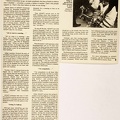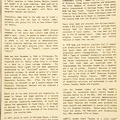The Handicapped Coloradan / Page 15 & 16
[This article continues in ADAPT 1786, but has been completely included here for easier reading.]
Title: "If heaven isn't accessible God had better Watch out!"
Photo: Waist up picture of Wade Blank with his below shoulder length blonde hair and round tinted glasses. He is smiling and wearing a vest. Caption reads: Wade Blank ADAPT founder dies in Mexico.
Wade Blank went down to Baja, California, in February and drowned there trying to save his eight year old son Lincoln.
He was there vacationing with his family. The money for the trip came from Wade’s share of a legal settlement in San Francisco when bad guys violated the civil rights of ADAPT demonstrators.
He couldn't afford that kind of trip on his own. He never made more than $16,000 in his life.
Lincoln was in the water swimming. An undertow got him and Wade went in after him. He had to know there was very little chance either one would survive. Some fisherman from a nearby village fished Wade’ s body from the water. His wife Molly brought his body home and they covered the coffin with an American flag. Only the stars on this flag formed a wheelchair. Lincoln’s body was never recovered.
A few days before he left on that vacation, I told him to skip Baja and its treacherous waters for the calmer seas off Mexico’s Yucatan Peninsula. Wade said he’d think about it but we both knew he wouldn’t alter his plans.
Wade Blank liked to be where the action was.
Many of the 1100 people who filled the ballroom at the Radisson Hotel on Sunday, Feb. 21, to say goodbye to their fallen comrade had accompanied him into battle. “If heaven isn’t accessible,” one of them warned, “God better watch out!”
Wade founded the Atlantis Community in 1975 when he helped several disabled people move out of a nursing home and into their own apartments. Then he went on to help organize protests against RTD for not having wheelchairs lifts on its buses, a move that later led to the creation of ADAPT, which then stood for American Disabled for Accessible Public Transit (“The hard part is getting the acronym right,” he told
me at the time.)
I asked Tom Olin who was going to replace Wade. “No one,” he said. “Wade was into empowering disabled people. It’s a tribute to him that we’ll just keep on going.”
Maybe.
But it won’t be the same.
People like Wade Blank don't come along very often. A writer for Westward once called Wade the nearest thing to a saint he had ever met.
But Wade wasn’t perfect.
After all, he was a Cleveland Browns’ fan.
He had it so bad that on game day he’d call home to his folks in Ohio and have them put the phone next to the radio. He was president of the Cleveland Browns Fans in Exile Club. A small part of him died when Elway found Jackson in the end zone in the 1987 AFC Championship game.
He was a devoted father who had a vasectomy reversed after he married Molly. He called me soon after the operation and bitched about having to lie still to prevent the tubes from severing again.
It was the only time I knew him to stay still.
The time spent was worth it. He loved Lincoln and Caitlan just as he loved Heather, his adopted daughter. He instilled in them special values. A neighbor recalled a time when she came home and observed Lincoln in front of his house directing some other kids. They weren't playing cowboy and Indian or war or any of the usual childhood games. They were playing rally. “All right,” Lincoln said. “United we stand, never apart.”
Wade was a Presbyterian minister whose language would make a coal miner blush. I quoted him a lot on these pages over the past ten years or so but I never quoted him accurately. He used four letter words the way other people use punctuation.
Someone made a TV movie about the events at Heritage Nursing Home and Wade said it was close to the truth. But the actor who played Wade didn’t quite capture his style.
Wade wore his hair long and looked a little like a construction worker who took a wrong tum back in the 1960s. He once asked me if I wore ties. “I own one,” I said. “It keeps my sleeping bag rolled up.” He liked that. He hated ties. At the memorial service, those few men who showed up wearing ties were asked to remove them—out of respect. By then I owned a real tie. You can‘t go to a funeral in my small hometown without one. I left it at home for Wade.
He didn’t have the eloquence of a Martin Luther King. He didn't need it. He wasn’t interested in grabbing the spotlight for himself. He taught his friends that their wheelchairs were a weapon and if they used them right, the whole world would take notice.
RTD took notice. Denver became one of the first cities in the U.S. to adopt accessible public transit. Wade helped carry that message to countless other cities. He showed people how they could make a statement by going to jail and then he went out and raised the bail money. Eventually, in a parking lot in Atlanta, the feds gave in. Accessible public transit would be the law of the land.
Wade wasn’t about to rest on his laurels.
He turned his attention to an earlier cause. ADAPT changed the acronym to American Disabled for Attendant Programs Today and took on the nursing home industry.
Wade knew that the disabled warriors who took on the federal government over accessible transit and got themselves arrested scores of times were strong enough to live in their own homes. He vowed to force the federal government to take money away from the nursing homes and make that dream a reality. That battle goes on. His friends at ADAPT are planning a memorial service in his honor in Washington, D.C. this May. At the same time, they’re going to make sure Bill Clinton honors his promises to provide funds for such attendant care.
It's a fitting memorial but you can find plenty of monuments to Wade Blank in this country. There one at every street comer where there’s a curb cut and one on every bus equipped with a lift.
And every time someone who is exploited because of a physical disability raises a fist in defiance and fights for his or her freedom and humanity, you’ll see Wade’s image in their eyes and his dream in their hearts.
So long, Wade. If it’s really heaven, there won’t be a dress code.
Written by Tom Schantz
- Author
- Handicapped Coloradan, Tom Schantz
- Created on
- Wednesday 24 July 2013
- Posted on
- Wednesday 9 October 2019
- Tags
- 1/2 peak time access, 100% accessibility, 100% lift equipped, 16th Street Mall, 1975, ADAPT - American Disabled for Accessible Public Transit, ADAPT - American Disabled for Attendant Programs Today, ADAPT flag, Atlantis Community, Baja, Caitlyn Blank, Cleveland Browns fan, crawling under vehicle, curb cuts, Denver RTD, drowned, empowerment, founder, funeral, Handicapped Coloradan, Heather Blank, heaven, lifts on buses, Lincoln Blank, memorial, minister, Molly Blank, nursing home, Presbyterian, President Bill Clinton, swearing, Tom Olin, TV movie, Wade Blank, wheelchair warriors, When You Remember ME
- Visits
- 2746
- Rating score
- no rate
- Rate this photo


0 comments